"What is marketing all about?" - Thoughts on marketing from a developer and rookie marketer

Recently I've been spending a lot of time learning about marketing, and a few things have started to click. I'm an engineer, and have a highly logical way of looking at the world. Marketing works on very different principles. There are no "right answers" necessarily, it's vague and shrouded in mystery.
After immersing myself in marketing content over the past few months, but really, the past year, I feel like I'm starting to understand a few things. This post is a brain dump of those things.
People buy based on emotions
People do not buy based on logic, they buy based on emotions. They want to feel freer, less frustrated, more relaxed, more in control, more confident, more optimistic, etc. They want to feel better because of your product.
When you give a list of features, they have to do mental gymnastics to figure out how those features translate into those emotions, and yeah, they'd rather not. You need to tell them yourself.
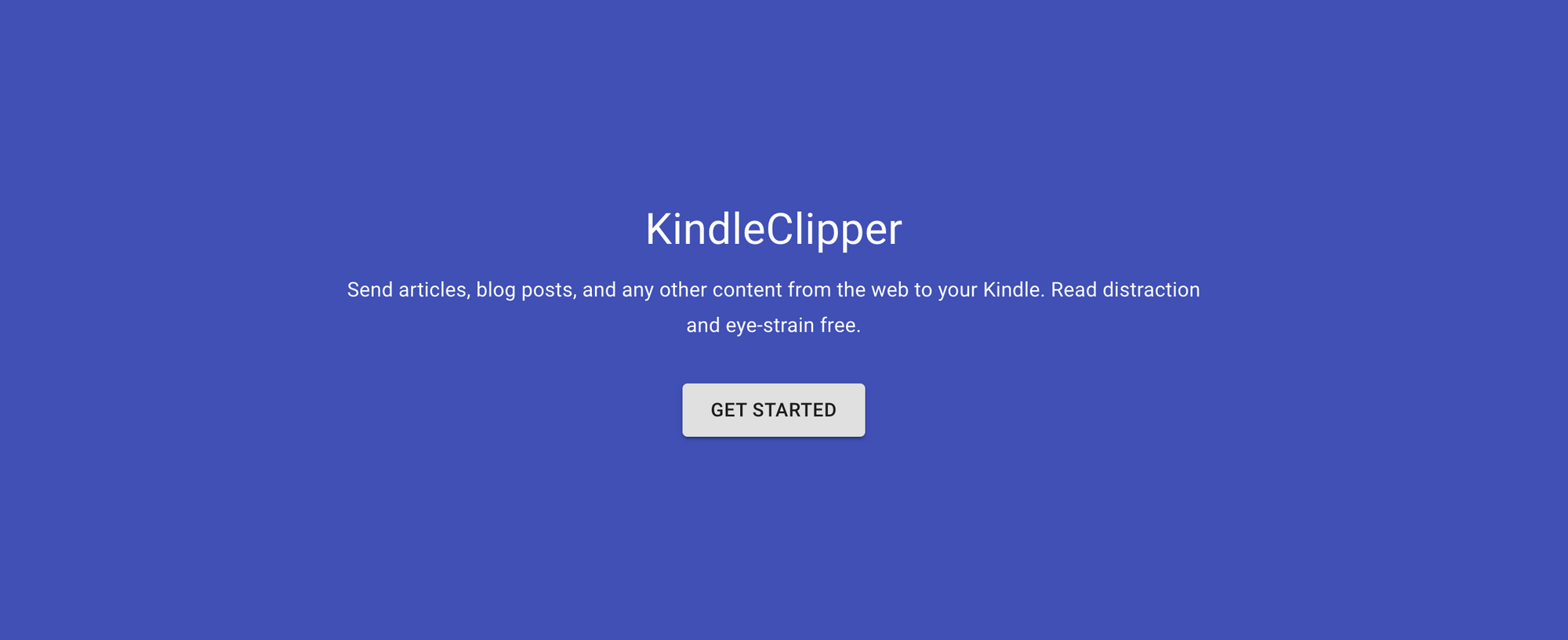
Look at my landing page above. "Read distraction and eye-strain free" is good. But it's a small subtext. Let's try and improve this.
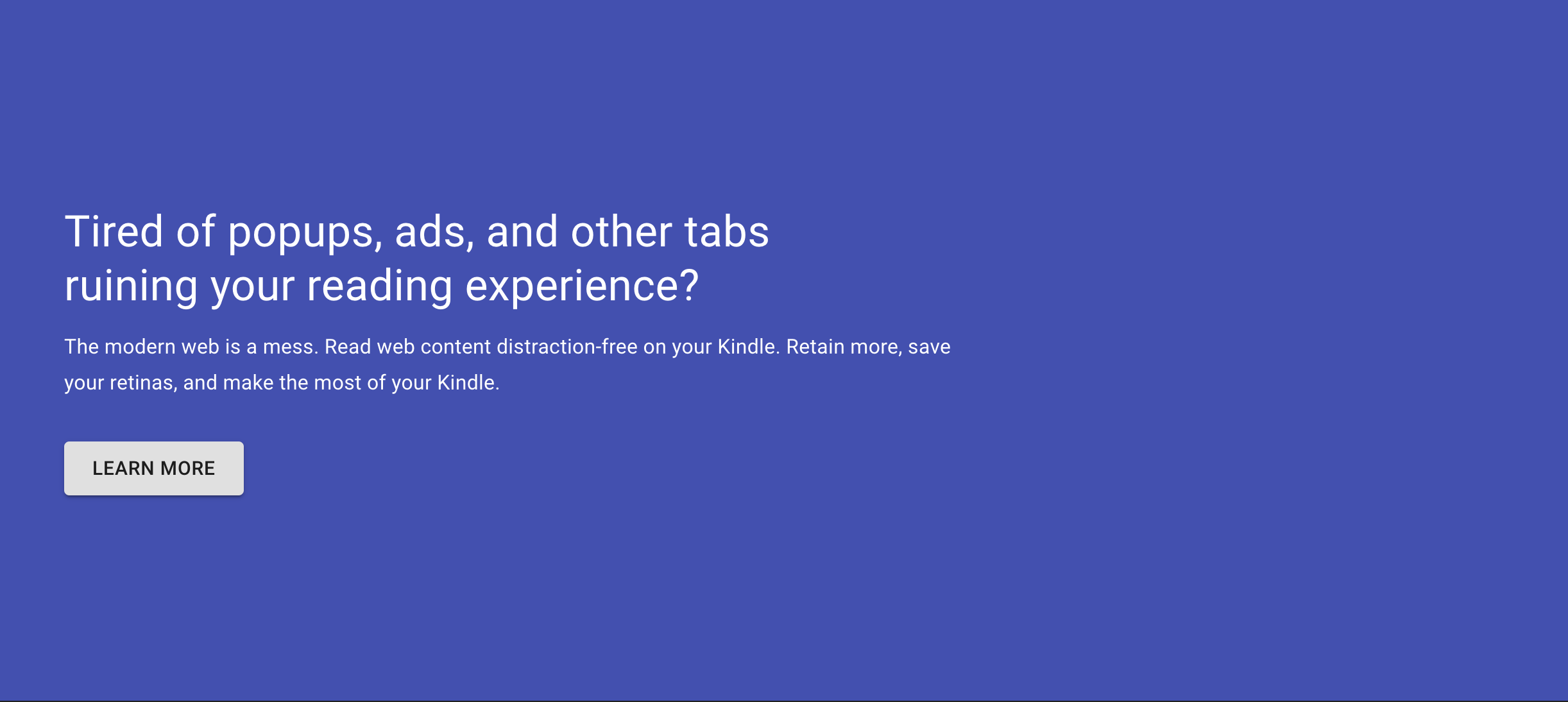
Now could this be improved further? Sure. But it's already way better, because we are putting the problem we're solving front-and-center. "Tired of" and "ruining your reading experience" are emotionally resonant. Emotions drive people to buy, or at least, to want to learn more.
In the first example, we fail to talk about what problem we are solving. "Send articles, blog posts, and any other content from the web to your Kindle". So what? Why do I care? ⌘+W (Yawn, close tab)
Vs.
"Tired of popups, ads, and other tabs ruining your reading experience?" Yes I am.
"The modern web is a mess" I agree. "Read web content distraction-free on your Kindle" I guess that would be nice. Could live without it just fine though. "Retain more, save your retinas, and make the most of your Kindle." So by being distracted less, I will retain more knowledge, save my eyes, and extract more value out of a device I already have? I definitely want to "Learn More"!
Do you feel the difference?
Problem - Agitation - Solution
This is a popular framework, and I can understand its appeal. In the past I've tried to sell features, or how "cool" it would be to have a product. But that doesn't really work.
The framework basically says that you start by stating the problem you're trying to solve. Then you "agitate" the problem, make it more painful by reminding the reader about the problem and its consequences, priming them to want to hear about your "solution" to the problem.
When you start with the problem, it's already pretty good. But by agitating it, you are increasing the desire for a solution, because you're reminding them how painful it is, or tell them why the problem is important to solve.
After you've done this, I'm ready for a solution. I'm feeling the itch, and I want it scratched.
Let's look at how this works in practice.
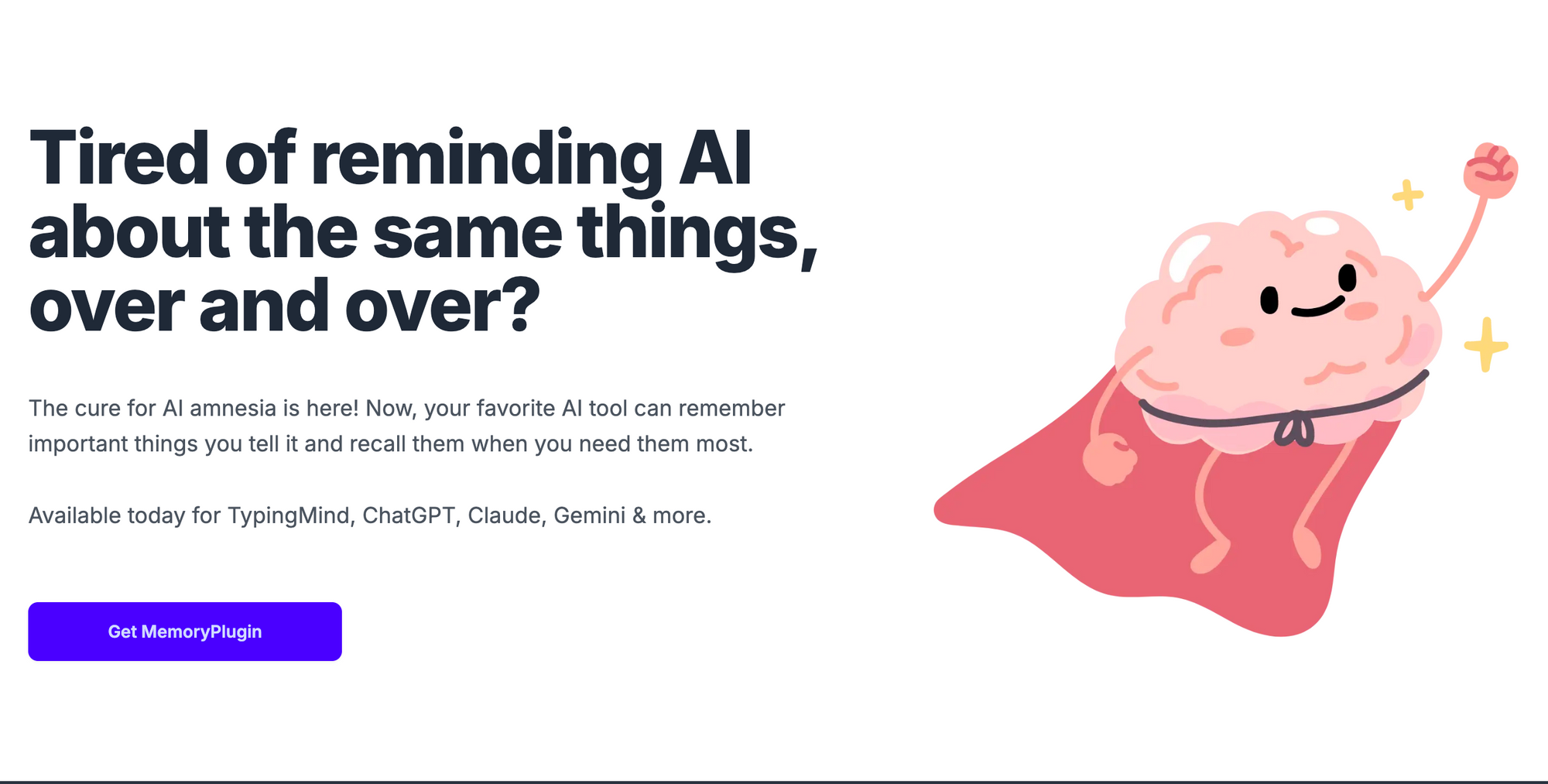
Hell yeah, I'm tired of repeating myself to the AI every single time. Here we've showcased the problem. This is a good start, but often times, it's not enough.
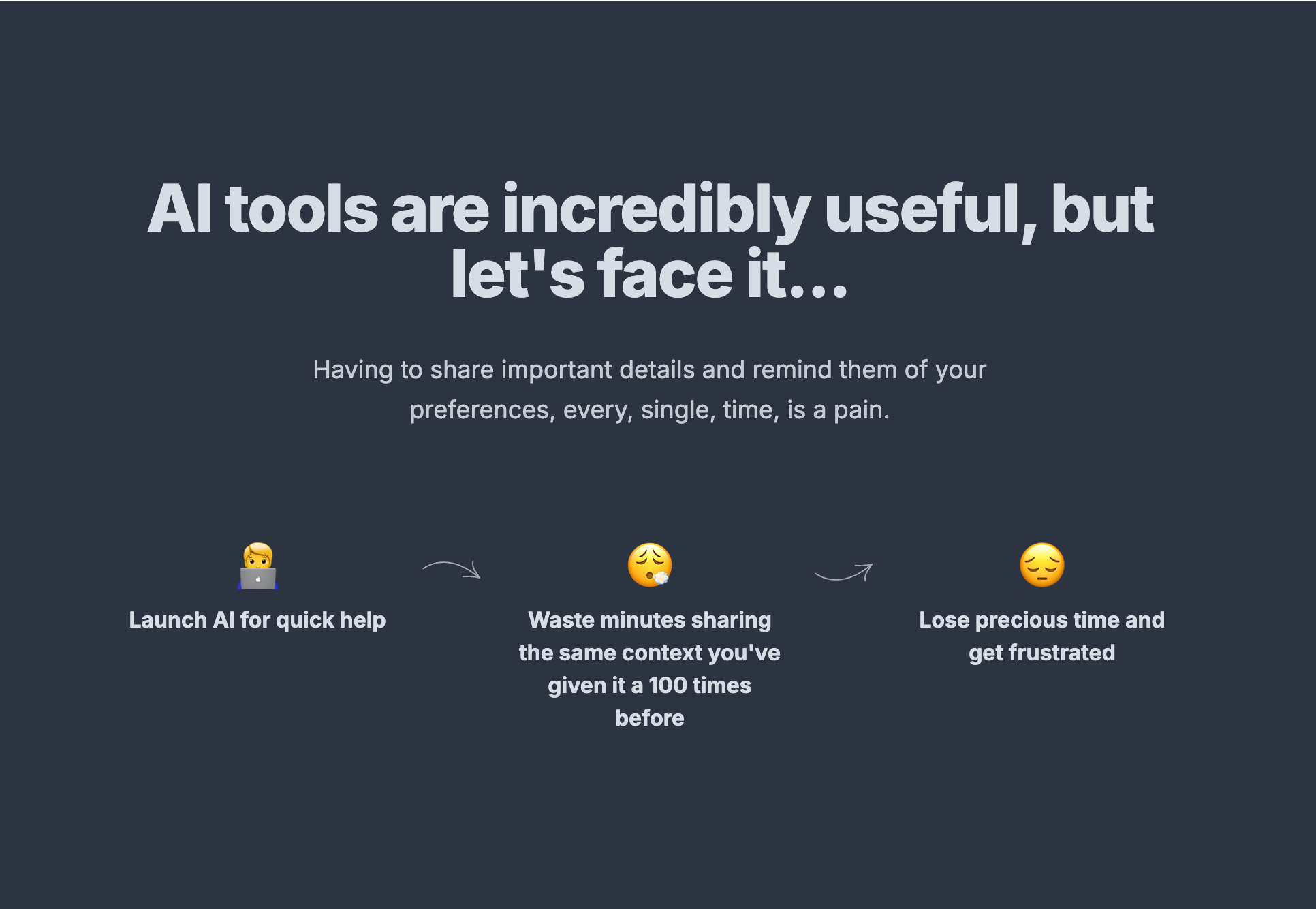
Now you're making the problem more painful. Yes it's frustrating to waste minutes each time, especially when I've already reminded someone of the same thing a 100 times before. It makes me angry. And it wastes so much of my time, leaves me in a worse mood. Now you've done it, now I'm agitated.
You told me about the problem, you showed me why a solution to the problem is important. Now are you going to actually solve it for me?
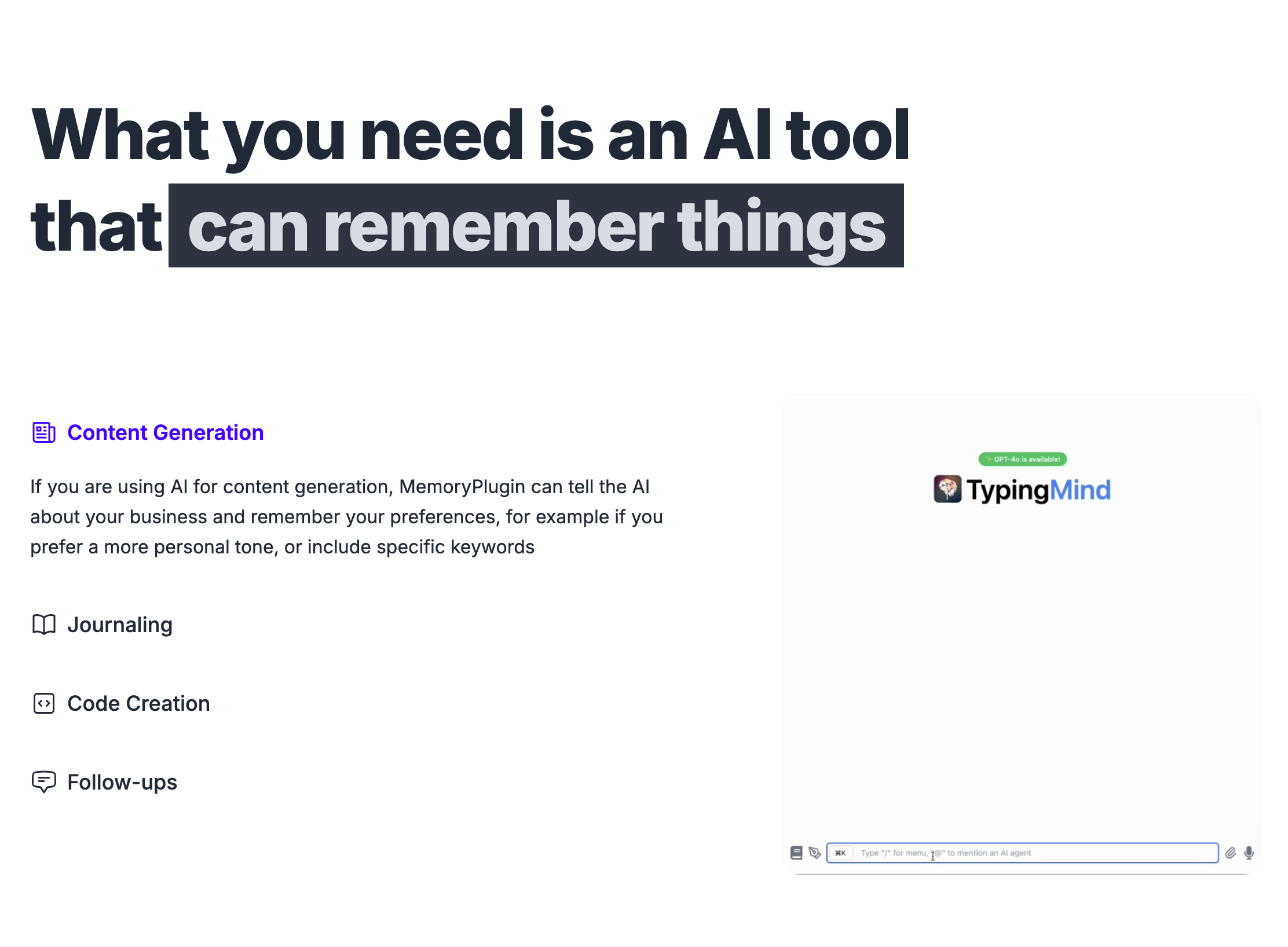
Right now as I write this, I can see room for improvement here, but everything has room for improvement.
You reminded me of the problem, made it more painful by showing me the consequences and reminding me of the acute pain I feel each time I'm faced with the problem. Now you're telling me the solution, which is "An AI tool that can remember things". Showing how it works and what it can be used for helps for sure. I can visualise how I'd use it. I can see that it won't be very difficult to use.
Compare this to an approach where you are just talking about features. Which also neatly brings us to our next category.
Features vs. Benefits
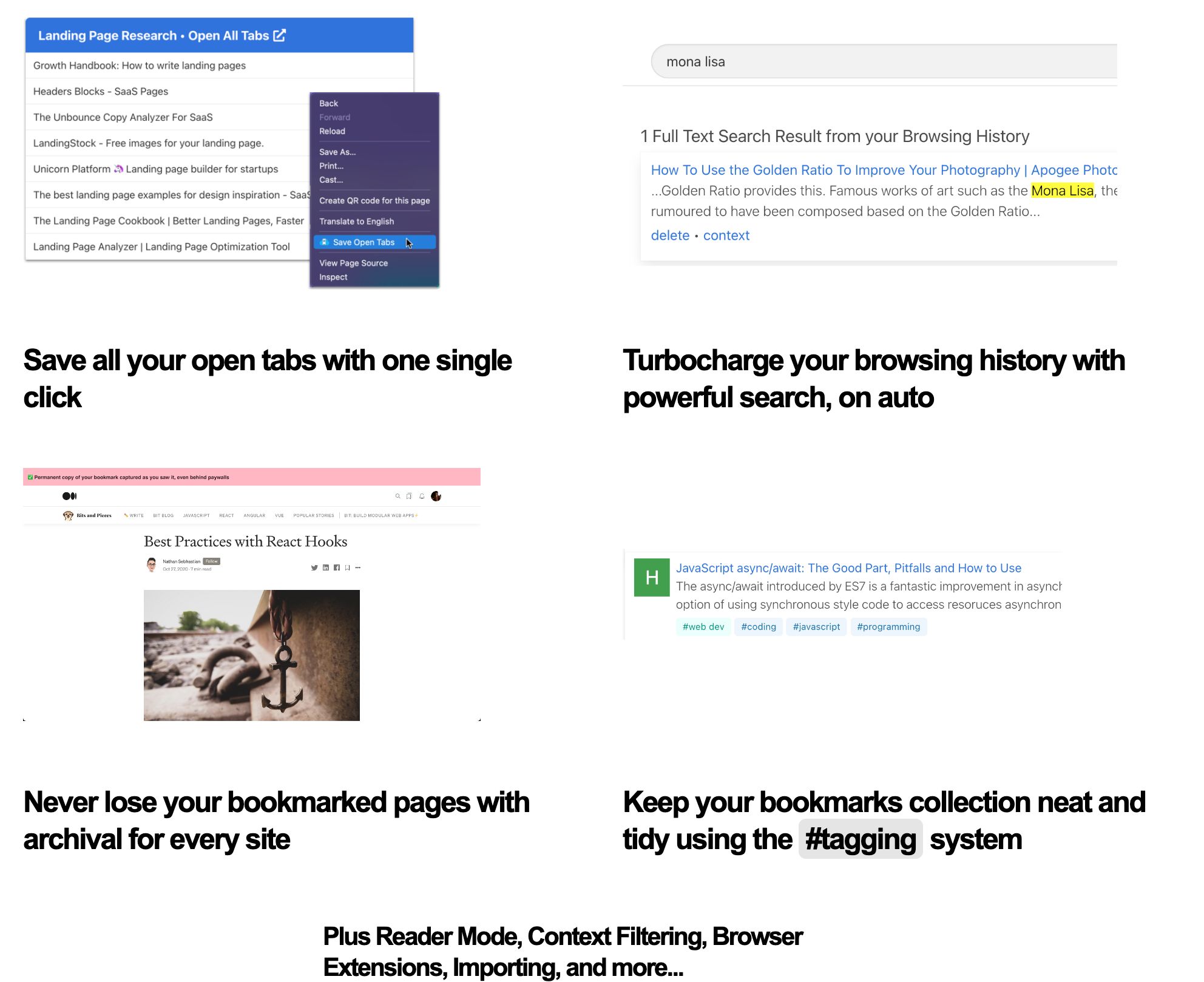
Sure, you have all these features, but do I even have a problem that is solved by them? I don't want to think about that, you are the one selling something to me, if you can't even be arsed with telling me the problem you solve with each feature, I don't care. The only redeeming one is "Never lose your bookmarked pages with archival for every site".
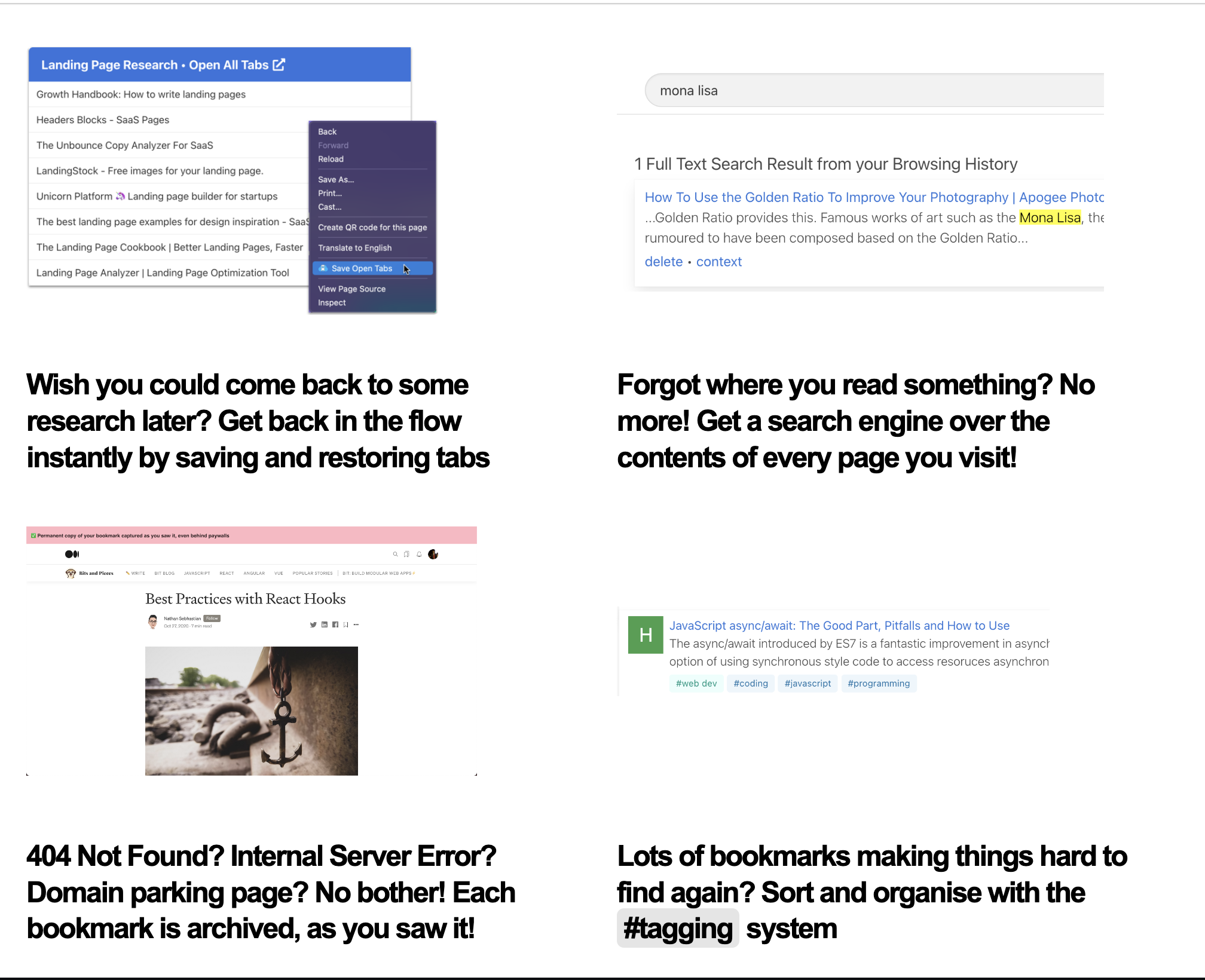
This is a quick rewrite of that section. Already way more emotionally resonant, right? I know what problem each feature solves instantly.
We only care about features because they solve a problem, people don't buy feature factories. Connect each feature to its benefit, to the problem it solves. This increases its value instantly, and it's just easier to read as a visitor to your site. If I have the problems you've mentioned, I'll feel like you "understand" me, making me more likely to believe in your ability to solve my problems.
Starting with Why
I recently rewatched the Simon Sinek TED talk about "Starting with Why".
It really resonated with me. People don't buy what you do, they buy why you do it. I really suggest watching the full talk.
This means starting with why your product exists. Why would someone want it? Why are you building it? If you think about it, this also relates back to features vs. benefits. Why are you building a specific feature? Lead from there. Starting with why also makes for a more emotional argument, which is more persuasive.
Starting with why means going from WHY -> HOW -> WHAT instead of the other way around
For example:
We have built an AI powered reading tool [WHAT].
It helps you extract insights from your books faster through AI-based interactions [HOW]
So that you can make the most of your library and capture the hidden insights in your books [WHY]
VS.
We believe our libraries contain life changing insights that we aren't using, and that it should be easier to extract these insights [WHY]
We can leverage cutting-edge technologies to solve the problem [HOW]
We just happened to make an AI-powered reading tool that helps you extract insights by talking to your books [WHAT]
--
Which one would you rather buy from?
Create intrigue
You want to nudge people to read what else you have to say. Curiosity is a powerful tool. We like gathering information, and we like knowing answers to questions.
Let's compare. The hero below gives it away in the first sentence. I immediately know what you are selling. Does this make me intrigued to read the rest? Maybe, maybe not.
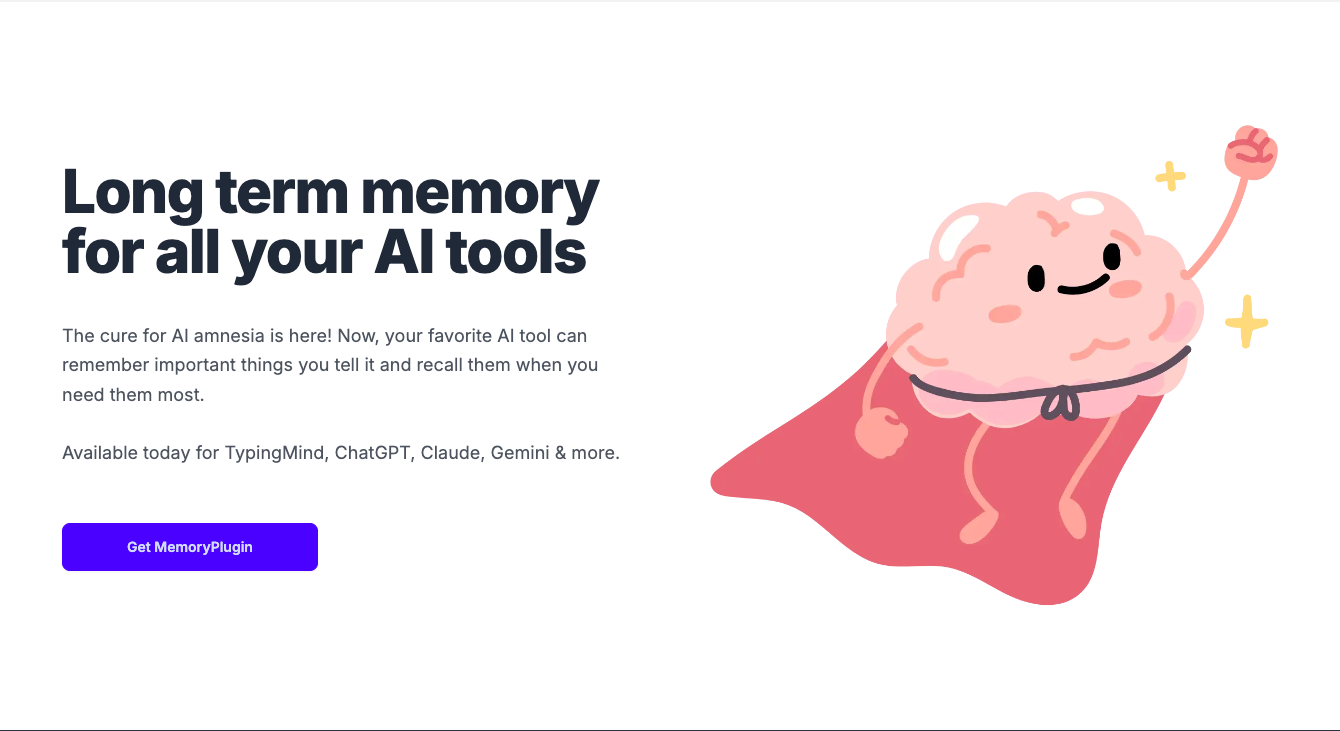
But take this alternative
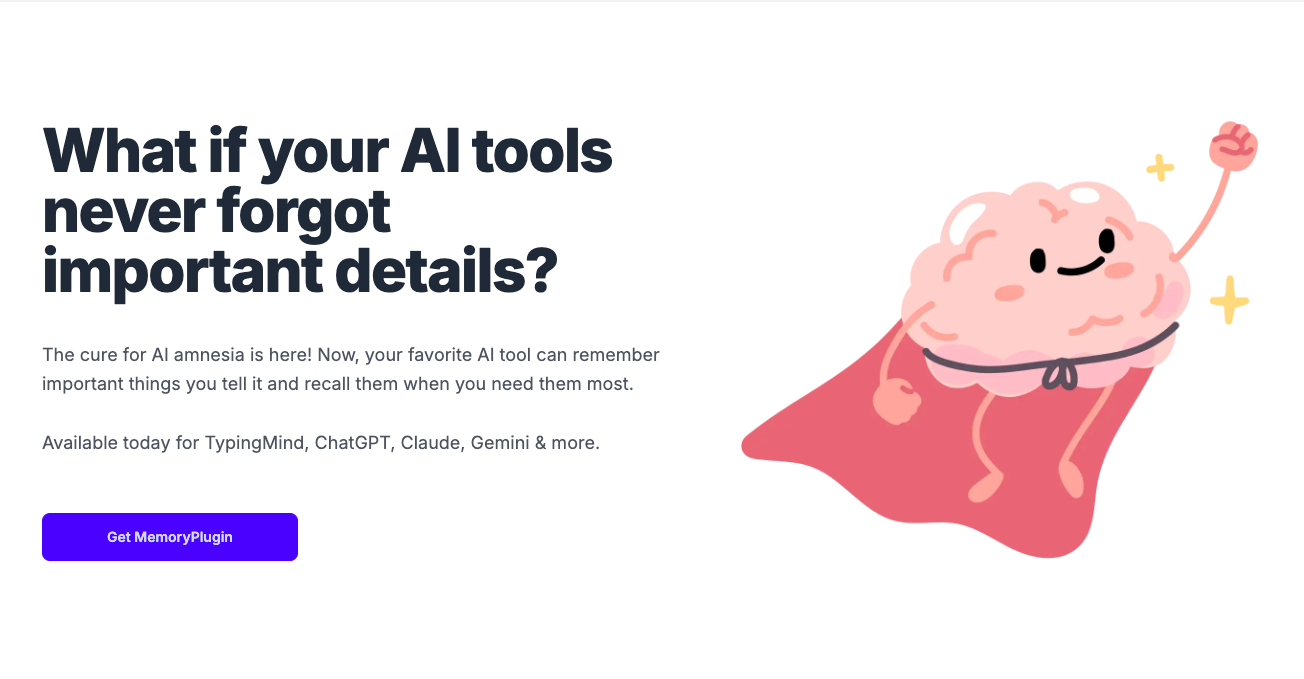
This is not an expertly written heading, but it creates intrigue, it makes the reader want the answer. "What if your AI tools never forgot important details?" How?
This keeps the visitor on your site for longer, it creates an itch for knowing the answer. And even if they don't buy, they do feel like they found an answer to a question. The answer is valued more if they had to work for it, vs. if it was freely given out with zero effort required. This would also increase recall of your tool.
Handle objections
On a landing page, let's say you've shown the person the problem, you've made it more painful by agitating it, and you've presented the solution. And now you show them the pricing. Before opening their wallet, they are likely to have several concerns. Will your product work for me specifically? Can I trust you to be able to solve the problem? What about my edge case scenario? What if after all, it still does not work for me? What am I risking? Etc. etc.
You have the viewer hooked and waiting for a solution. It'd be truly painful to have them ready to click buy but lose them because you didn't handle one of these objections.
Objections can be about ease of use, which could be handled by showing "how it works". They could be various questions, that can be handled in FAQs. They could be about your credibility, handled by testimonials or other signals, they could be about how deeply you understand the problem, which can be handled by your overall copy.
When someone visits your website, you are not able to answer their doubts, so your website better do it for you.
Remember, doubts are good, we want customers to make decisions that are right for them, we want them to feel confident in their decision to buy our product, we want them to feel understood.
Selling to everyone = selling to no one
This has been a painful lesson on the importance of niching down. We want to go broad, we want to have a large target audience to make millions or billions, but when you are starting out, more often than not, it's a recipe for suicide.
Remember, Facebook started with colleges. Amazon started with just books. You can always go broader later.
When you target a large market, there's likely to be a lot of competition. Which means you need to compete harder for attention. There's likely bigger potential upside, which means larger players might be interested in the same space and can outcompete you with their big teams and fat marketing budgets.
Not to mention, when you want your messaging to resonate with a large audience, your messaging will be broader (read: vague), so a lot of people will read it and be like, "oh yeah, I've faced that problem, would be nice to have a solution for it", but few will be like "oh my god this problem has driven me nuts and I am aching for a solution and I need it now".
For example:
Extract insights from any document or ebook in seconds using our AI powered tool [Selling to everyone]
VS.
Supercharge your professional growth by extracting insights from your library in seconds using AI [Selling to one person, in this case, a busy professional]
One message has broad appeal to almost anyone, I mean, who doesn't want to save time? But I might read that, and I might be like, "eh, I could take it or leave it".
The second message catches my eye as a busy professional. A busy professional probably does want to supercharge their professional growth. Do you see how, when you are targeting a smaller niche, your message can be more tuned to their needs, making it more emotionally resonant?
You can also focus on solving the problems of this specific group of people, and you can focus on doing it better than any of the generic broad-market tools.
You might have fewer users, but you will have more loyal users. And you do not need a million users to have a good business.
Landing page flow
Landing pages generally follow a similar flow and structure. The most effective ones, anyway.
[HIGHLIGHT THE PROBLEM]
[SHOW YOUR SOLUTION]
[HANDLE OBJECTIONS]
There are many variations, but on a broad level, this structure is very common.
You highlight the problem, maybe agitate it.
You show your solution, maybe with a demo.
At this point, the visitor might have doubts or objections. You handle them. They know the problem, feel its pain, see your solution, imagine a better future, have concerns if this will actually work, you solve the concerns, and then they can confidently make a decision.
The perfect is the enemy of the good
You can spend weeks perfecting your copy, trying to get it "just right". You might do 10 exercises trying to nail your ideal customer profile.
And then you put it out there, and hear crickets.
"No battle plan survives contact with the enemy"
Perfectionism is a form of procrastination. Good enough, is good enough.
Put something out there, see if it works, and improve from there.
Aiming to reach perfection on day one, a truer "fools errand" doesn't exist.
To be honest, only when I let go of my perfectionist tendencies, stopped overthinking things, did I feel confident enough to put my products out there, and actually, to my surprise, started seeing results.
There's always room for improvement. But, often, Good Enough, is Good Enough.
What does the customer need to believe in order to buy?
I'm not going to lie. For the longest time, marketing has felt "icky" to me. Making things feels "pure", but there's so many sleazy marketers and marketing tactics out there, they give the entire field a bad rep. When we think of marketing, we think of the used car salesman or scammy "get-rich-quick online-course" "marketer". Because when we think of marketing, only the worst examples come to mind.
Good marketing doesn't feel like "marketing". I love my Apple Watch, but I don't feel like I was marketed to. Our homes are filled with products we love, products we recommend to other people, and we don't remember them being marketed to us. This is a challenge, because we readily remember instances of bad marketing and easily forget good marketing.
I have recently been reading "Simple Marketing for Smart People", and the book talks about how we can think of marketing as educating instead of selling. We want to educate our customers about the problem. We need to ask ourselves, "What does the customer need to believe in order to buy?", and then we need to build those beliefs.
Belief building happens by educating customers about the problem, its consequences, potential solutions, and then ultimately explaining why your solution is the best answer for them. And it might not be, which is totally fine. We make them capable of deciding that for themselves.
With this educating approach, we are focused on delivering value through our marketing, which also helps build long-term credibility.
We are educating people about the problem our product solves, and letting them decide for themselves. See how this is immediately less "icky" than "sleazing our way into making sales"?
I would rather not make sales than make them by dishonest means. And when we start thinking of marketing as educating, and we start using the belief building technique, we feel more honest, and more in our element. Creatives, especially technical ones, are driven by finding the truth, and this makes being truthful more appealing.
Doing things that don't scale
Early on, you have to do things that don't scale. That means searching for individual users, and personally reaching out to them. These should be highly relevant, don't "spray and pray". I'm sure people have success with it, but I don't want to spam people.
I've reached out to individual people who have mentioned facing the problem I am solving, explained to them how they can solve the problem with my tool, answered all their doubts, and got sales out of this.
You are offering someone a solution to their problem, because you know they have the problem. Please don't spam people.
When doing this, I've hand-written messages each time, no automation. And those non-polished messages can be spotted among a mountain of copy-pasted or AI-generated "spam".
(Almost) Nothing is gospel
In marketing, all "rules" are mental models that are generally true. But they can be more or less true in a given situation. To be able to understand when something is or isn't true, you need intuition with marketing, which only comes with, you guessed it, experience.
